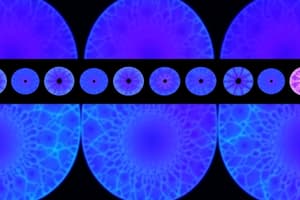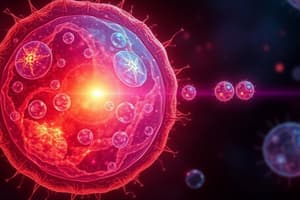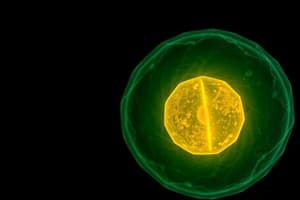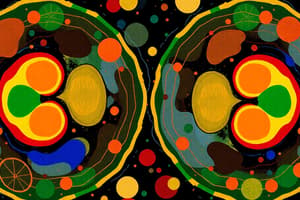Podcast
Questions and Answers
What process do cells undergo to develop from a single cell to an organism?
What process do cells undergo to develop from a single cell to an organism?
Cell division
What types of cell division are there?
What types of cell division are there?
- Fission
- Budding
- Meiosis (correct)
- Mitosis (correct)
Mitosis is done on reproductive cells.
Mitosis is done on reproductive cells.
False (B)
What is the period called when a cell prepares for division?
What is the period called when a cell prepares for division?
The nuclear membrane separates genetic material from the ______.
The nuclear membrane separates genetic material from the ______.
Match the phases of mitosis with their descriptions:
Match the phases of mitosis with their descriptions:
What types of chromosomes are moved to opposite sides during mitosis?
What types of chromosomes are moved to opposite sides during mitosis?
The nucleolus disappears during mitosis.
The nucleolus disappears during mitosis.
The pinching inwards of the cell membrane occurs in ______ cells.
The pinching inwards of the cell membrane occurs in ______ cells.
What structure is responsible for organizing chromosomes during mitosis?
What structure is responsible for organizing chromosomes during mitosis?
Flashcards are hidden until you start studying
Study Notes
Cell Division
-
Cell division is the process by which living organisms grow and reproduce.
-
All living organisms start as single cells and develop into complex organisms with trillions of cells.
-
Cell division is simpler in prokaryotes than in eukaryotes.
-
Prokaryotes have a circular chromosome and lack organelles like the nucleus.
-
Eukaryotes have multiple chromosomes located within the nucleus.
-
There are two main types of cell division: mitosis and meiosis.
Mitosis
- Mitosis occurs in somatic cells, which are all cells in the body except for reproductive cells.
- It results in two new daughter cells that are identical to the parent cell in terms of genetic material.
- Mitosis involves the copying of genetic material and its equal distribution into two daughter cells.
Interphase
- Interphase is the period before a cell begins to divide.
- During interphase, the cell grows, replicates its genetic material, and prepares its organelles for division.
The Phases of Mitosis
- Mitosis occurs in four phases: prophase, metaphase, anaphase, and telophase.
- Prophase may be further divided into two phases: prophase and prometaphase.
Prophase
- During prophase, chromosomes condense to facilitate their movement and the mitotic spindle forms.
- The mitotic spindle is composed of microtubules that organize the chromosomes during cell division.
- Prophase also marks the disappearance of the nucleolus, breakdown of the nuclear membrane, and capture of chromosomes by the microtubules.
Prometaphase
- Prometaphase follows prophase and is characterized by the breakdown of the nuclear membrane.
- This allows the chromosomes to move into the cytoplasm, where they are captured by the microtubules of the mitotic spindle.
Metaphase
- The chromosomes align at the center of the cell, ready for separation, during metaphase.
Anaphase
- The sister chromatids of each chromosome are pulled apart by the mitotic spindle and move towards opposite poles of the cell.
- After the separation, the homologues chromosomes (daughter chromosomes) migrate to opposite sides of the cell.
Telophase
- The nuclear membrane reforms around the separated chromosomes, creating two new nuclei.
- In animal cells, the cell membrane pinches inwards, creating two daughter cells.
- In plant cells, a new cell wall is constructed between the daughter cells.
- The parent cell splits in half to produce two daughter cells.
Centrioles
- Centrioles are important for the formation of the mitotic spindle and are responsible for microtubule organization and separation of chromosomes during cell division.
Studying That Suits You
Use AI to generate personalized quizzes and flashcards to suit your learning preferences.




